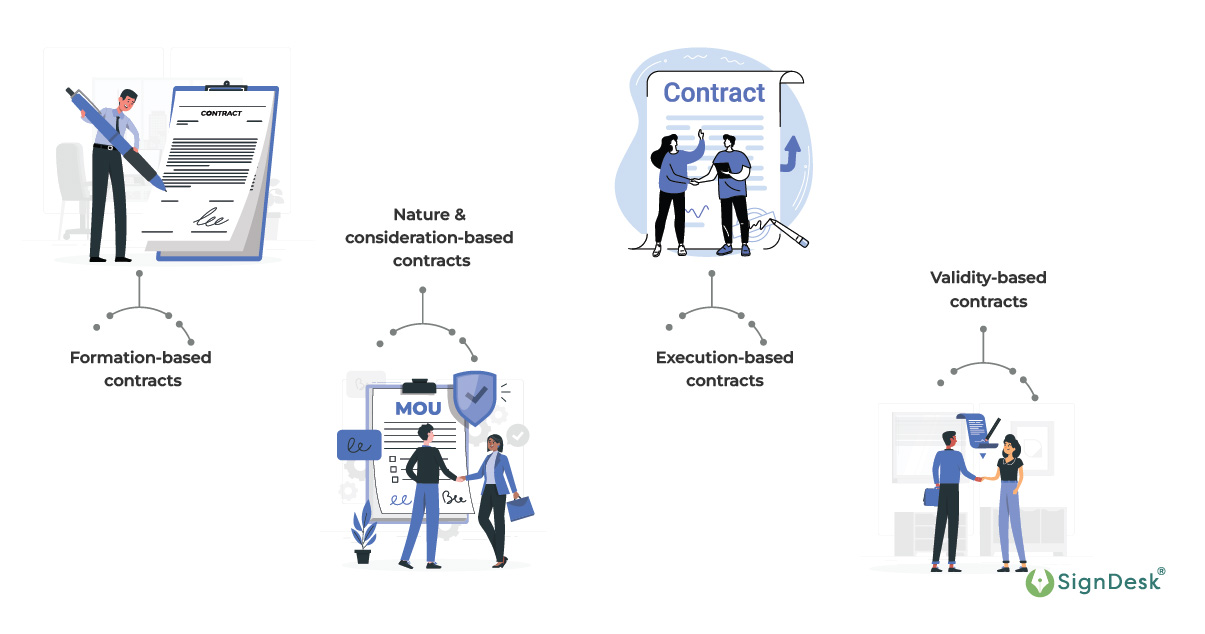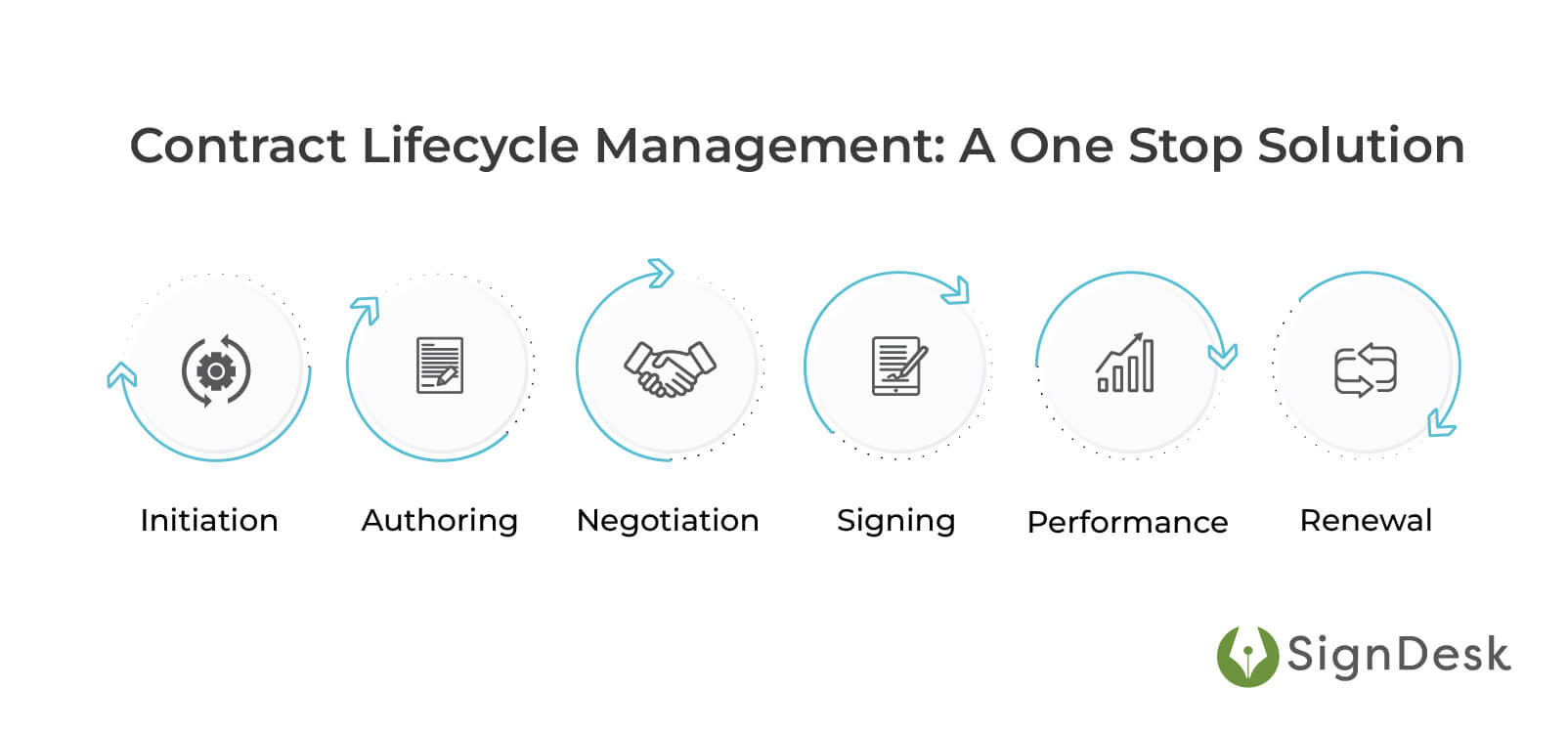Introduction
A contract is an enforceable legal arrangement that establishes, details, and regulates the rights and duties of the parties. The transfer of commodities, services, money or a promise to transfer any of those at a later time are common components of contracts. The Indian Contract Act, 1872’s Section 2(h) defines a “Contract” as “An arrangement enforceable by law.”
The Indian Contract Act of 1872 specifies the requirements that must be met for a contract to be recognised legitimate. These consist of:
- Offering and Acceptance
- Free permission
- Volume
- Legitimate consideration
These requirements are designed to ensure that the two parties entering into a contract with one another are of legal age, have the necessary capacity, and are acting freely and lawfully. The contract must also contain an offer and a verifiable method of accepting it.

In other words, anything that is a legally binding agreement falls under the definition of a contract. Contracts are further divided into different categories based on their purpose and needs.
1. Contracts in Business Law
1.1 Formation Based Contracts
1.2 Nature & Consideration Based Contracts
2. Contracts In Project Management
2.2 Time and Material Contracts
2.3 Cost Reimbursable Contracts
Types Of Contracts In Business Law
The types of contracts in business under the Indian Contract Act are based broadly on four different categories. These main categories of contracts are classified according to formation, nature, execution & validity.

- Formation-based contracts
- Nature & consideration-based contracts
- Execution-based contracts
- Validity-based contracts
Each of these contract categories can be further divided into sub-categories.
Formation Based Contracts
These types of contracts are classified based on the mode of formation and further divided into four different sub-categories –
- Implied Contracts – A legally-binding obligation that results from the actions, behavior, or circumstances of one or more parties to a contractual agreement is known as an implied contract.
- Express Contracts – An express contract is one in which all of the terms have been agreed upon by the parties at the moment the agreement was made in writing or in verbal mode.
- Quasi-Contracts – The Quasi-Contract is a contract between two parties that is retrospective in nature. There are no prior ties between the parties in this kind of contract. A judge creates it to remedy situations when one party gains something at the expense of the other party.
- E-Contracts – Contracts that are created using electronic, cyber, or electronic data exchange methods are referred to as e-contracts. Email, telephone, and more recently digital signatures are tools that help create an electronic contract.
Contracts Based On Nature & Consideration
Contract classification in this category when their nature is varied and unique to the parties involved. Broadly speaking, they can be categorized as –
- Unilateral Contracts – In these types of contracts, an agreement is made where one party agrees to pay a certain amount only after the occurrence of an action. Such contracts can only be carried out if the contract’s promise is kept by the other party.
- Bilateral Contracts – These are contractual agreements where both parties make an agreement that’s mutual. As a result, the parties involved are established, and the contract is created through the exchange of proposals and agreements. These agreements, often known as two-sided contracts, are the most typical type of contracts used today.
Execution Based Contracts
These are contracts that may be carried out in accordance with time. The timeline for the fulfillment of the commitment should be taken into account for execution-based contracts. The contracts classified based on periods of time can be divided into the following categories:
- Executory Contracts – A contractual agreement where both parties have ongoing performance requirements or when there are unfulfilled duties on both sides. For instance, the majority of leases and contracts for the sale of commodities in which the buyer has not made the required payment and the vendor has not delivered the products are executory contracts.
- Executed Contracts – A signed agreement that creates a business relationship between two or more parties is known as an executed agreement. Each party promises to uphold the legal duties agreed upon within the written agreement once the contract is fully executed.
Validity Based Contracts
These types of contracts are founded on legal ramifications. The types of legal contracts under this category are:
- Valid Contracts – According to the definition of a valid contract, it is a deal that is legally enforceable. A contract must comply with section 10 of the Indian Contracts Act of 1872 in order to be enforceable. The Indian Contracts Act of 1872’s Section 10 states that all agreements are considered to be contracts if they are freely entered into by parties who are legally able to do so, are formed for legal consideration, have a legal purpose, and are not expressly disregarded by this declaration. Legal contract management software can assist in ensuring compliance with these requirements by helping parties track and manage contract terms, deadlines, and obligations.
- Void Contracts – Section 2(j) of the Indian Contracts Act of 1872 defines a void contract. A void contract was originally a valid contract, but as a result of modifications made to some of the original terms, it is now void. A void contract has no obligations or rights concepts and cannot be enforced by any party. Even if both parties agree, these agreements are illegal and cannot be upheld.
- Voidable Contracts – An agreement that is enforceable by law at the discretion of one or more of the parties involved but not at the option of the others is said to render a contract voidable. Simply put, the terms of the contract must be binding on at least one of the parties. The other party, who might be a minor or temporarily unable to enter into a contract for other reasons, is not bound by it and is free to reject or accept its conditions. The agreement is void if the latter decides to renounce it.
- Unforceable Contracts – If a contract does not satisfy the necessary legal requirements, it is not enforceable. After fulfilling these requirements, which typically take the form of technical errors, a contract of this kind can be enforced.
- Illegal Contracts – According to section 23 of the act, a contract may be void or illegal. A contract is termed illegal if it violates some law or is in conflict with public policy. An illegal contract is different from a void one. These types of agreements are the ones that the law only states that the court will not enforce if it is made, as opposed to an illegal contract, whose consideration is prohibited by the law.
Contracts In Project Management
Any project is incomplete without contracts that detail the obligations between one or more parties. The types of agreements in project management are:
- Fixed Price Contracts – When the criteria for the work are understood and the scope of the work is clearly specified, fixed price contracts are used. The vendor is expected to provide a fixed price quotation for the agreed scope of work once the scope has been properly specified. While preparing a fixed price quotation, the seller must be aware of both the project’s requirements and all associated risks that could arise during the project. As a result, the seller must also be capable and mature enough to warrant a set price deal.
- Time and Material Contracts – Time and material contracts are a very common type of contract that are used for the routine purchase of common items. In most cases where time and material contracts are used, the organization will choose its preferred vendor based on its capacity and experience. The price for the supplies will then be negotiated and paid.
- Cost Reimbursable Contracts – In a cost-reimbursable contract, the buyer covers both the seller’s real costs plus a surcharge or profit. These types of contracts will usually consist of two separate payments for two components. The charged amount is typically pre-determined, whereas the actual expense is refunded as it occurs.
The above-mentioned types of contracts can also be classified into categories of types of services contract. A service contract is an agreement between a company and the clients or customers they serve. The terms and conditions of the services the company will offer are described in this document.
Types Of Service Contracts
Apart from the ones mentioned above, the types of contracts that exist in services are as follows:
- Termination Contracts – A Not To Exceed (NTE) contract is a combination of a time and materials contract and a fixed price contract. These contract arrangements, also known as time and materials with a limit, are intended to reduce the client’s exposure to risk even more than a fixed-price contract.
- Retention Contracts – Retainers appear in a variety of professional services agreements including consulting arrangements. Retainers are frequently used in the context of professional services when short turnaround times are required and the completion time of the work remains unknown. A retainer-based agreement’s terms might vary greatly, but its fundamental tenet is that the client will pay a predetermined sum upfront in exchange for receiving services within a predetermined time frame.
- Recurring Subscription Contracts – A professional services firm’s primary product is quickly evolving to include subscription-based services. A subscription model may be effective for a PSO, depending on the services it provides. Clients will pay a regular monthly fee for recurring deliverables under this type of arrangement.
- Managed Services Contracts – Managed services contracts are increasingly being used by conventional professional services organizations and consulting firms. In the past, managed service providers (MSPs) offered managed services agreements that were centered on delivering a particular level of services over a protracted length of time.
Contract Lifecycle Management: A One Stop Solution
The journey of a contract, from its initial draught through its final execution procedure, is known as the contract’s lifecycle. The process of overseeing and optimizing the lifecycles of contracts is called contract lifecycle management.
In the context of contracts, a “life cycle” is a model used to comprehend and categorize a contract’s numerous stages. The contract lifecycle journey starts with submitting a request for a contract and includes all important phases of a contract, such as execution, tracking, intelligence, and renewal.
The steps involved in automated contract lifecycle management are:

- Initiation – A contract is requested and assigned to a member of the legal team. Contract requests are tracked on a smart dashboard.
- Authoring – Clause and template libraries are used to draft legally valid contracts.
- Negotiation – Once the contract’s been approved, parties are invited to digitally negotiate the terms of the contract. Parties make and accept suggestions to negotiate, and transparency is maintained by recording comment and suggestion histories.
- Signing – The parties execute the contract using digital signatures. A signature certificate is generated and can be used to verify the signers. The signed contract is then tagged and stored in a searchable central repository where it can be accessed by only specified users.
- Performance – The contract is performed and by both parties, contract performance is tracked using smart analytics and used as a tool for risk management and improved decision making.
- Renewal – Automated alerts are sent to relevant users informing them when a contract’s about to expire or up for renewal.
How Does Contract Lifecycle Management Streamline Business Contract Processes?
The field of contract lifecycle management has seen a significant change recently. Numerous contracts, each at a different stage of the contract lifecycle, must be juggled at once by organisations of all sizes. To stay up with changing company needs and the digital environment, they must continuously evaluate and improve their contract-related processes.
Organizations are now implementing automated contract workflows that enable intelligent workflow and virtual contract cooperation to overcome these difficulties. Contract lifecycle management best practises are always changing, with innovations at their core.
An organisation may monitor and control each stage a contract goes through with the help of contract lifecycle management.
Here are some ways that businesses might use effective CLM software to address contracting issues:
- Utilize clause tagging, centralised contract storage, and contract analytics to speed up the contracting process.
- Using template libraries, AI-enabled clause suggestions, and automated contract processes, to reduce the number of manual tasks and dependencies involved in contract processing along with form builder
- Using automated renewals, performance tracking, and better contract status visibility, to streamline the pre and post-signature phases.
- Improved collaboration between the legal and sales departments will help to shorten and speed up the review and negotiation procedure.
- Utilizing scalable upload & eSign procedures, eSignature connections, and a virtual audit trail, to expedite contract execution and improve audit efficiency
CONTR.ACT: SignDesk’s Total Contract Lifecycle Management Solution
With SignDesk’s end-to-end CLM tool – CONTR.ACT – you can draft contracts and negotiate provisions in real-time. Additionally, CONTR.ACT offers simple eSignature and eStamping integrations for speedy and secure contract execution. The CLM product of SignDesk helps in managing bulk contracts and contract repositories, enables a smooth operation, and cut the turnaround time in half. The automation has resulted in significant expense savings for our clients in different types of contracts including entertainment industry contracts and contract manufacturing software.
Contact one of our sales professionals to learn more about our contract lifecycle management with a free demo.
Get a free trial now!